Enhancing emotional intelligence can significantly improve self-awareness, resilience, and interpersonal skills. This article explores key components of emotional intelligence, including self-regulation and empathy. It outlines effective strategies such as mindfulness practices and active listening exercises. Additionally, it addresses common misconceptions and emphasizes the importance of continuous learning for sustained growth.
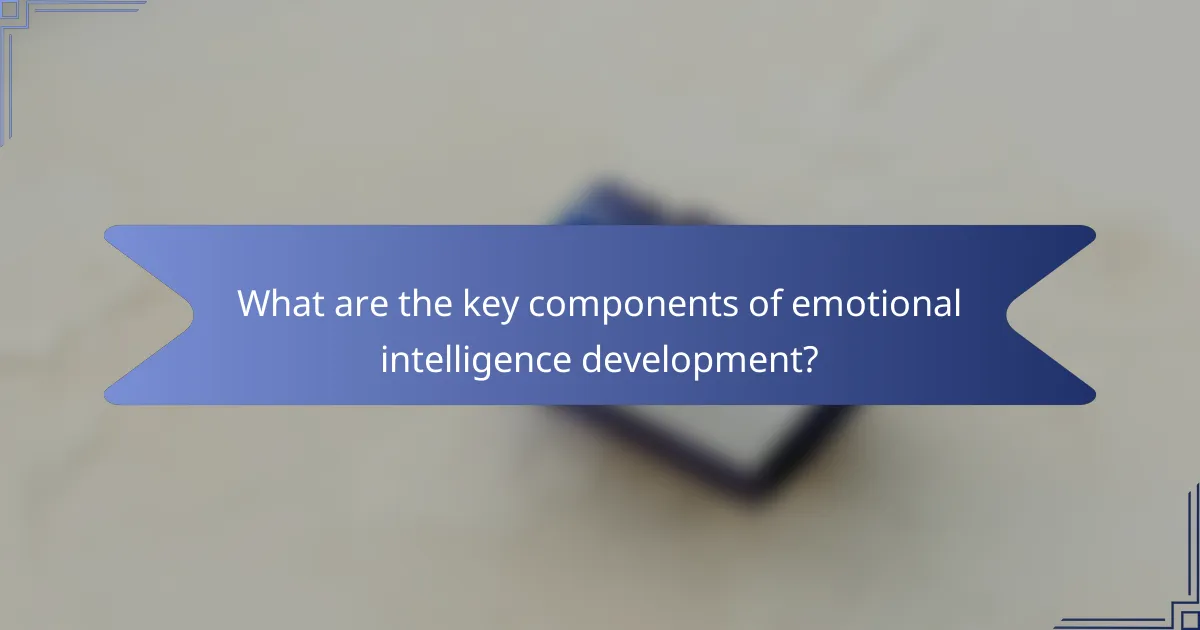
What are the key components of emotional intelligence development?
Key components of emotional intelligence development include self-awareness, self-regulation, motivation, empathy, and social skills. These components enhance personal and professional relationships.
Self-awareness involves recognizing one’s emotions, strengths, and weaknesses. Self-regulation refers to managing emotions and impulses effectively. Motivation drives individuals to achieve goals and maintain a positive outlook. Empathy is the ability to understand and share the feelings of others. Social skills facilitate effective communication and relationship-building.
Developing these components leads to improved resilience and interpersonal skills. Engaging in reflective practices, seeking feedback, and practicing active listening are effective strategies for growth in emotional intelligence.
How does self-awareness contribute to emotional intelligence?
Self-awareness significantly enhances emotional intelligence by enabling individuals to recognize and understand their emotions. This recognition fosters better emotional regulation and improves interpersonal relationships. Self-aware individuals can identify their emotional triggers, leading to more effective responses in social situations. As a result, they exhibit greater resilience and adaptability in the face of challenges. Developing self-awareness through reflection and feedback is a key strategy in nurturing overall emotional intelligence.
What role does resilience play in emotional intelligence?
Resilience significantly enhances emotional intelligence by enabling individuals to manage stress and adapt to challenges effectively. This adaptability fosters better self-awareness and interpersonal skills. Resilient individuals can navigate emotional upheavals, maintaining focus on their goals. As a result, they build stronger relationships and improve their overall emotional regulation. Resilience acts as a unique attribute within emotional intelligence, distinguishing those who thrive under pressure from those who struggle.
How can interpersonal skills be enhanced through emotional intelligence?
Emotional intelligence can enhance interpersonal skills by fostering self-awareness and resilience. Developing emotional intelligence involves recognizing and understanding one’s emotions, which leads to better communication and relationship management.
Active listening is a key strategy; it promotes empathy and connection with others. Practicing mindfulness can also improve emotional regulation, allowing individuals to respond thoughtfully rather than react impulsively.
Additionally, seeking feedback from peers enhances self-awareness, helping individuals identify areas for improvement in their interactions. Engaging in role-playing scenarios can further develop these skills by providing practical experience in managing emotions and responding to social cues.
Incorporating these strategies consistently leads to improved interpersonal relationships and a more collaborative environment.
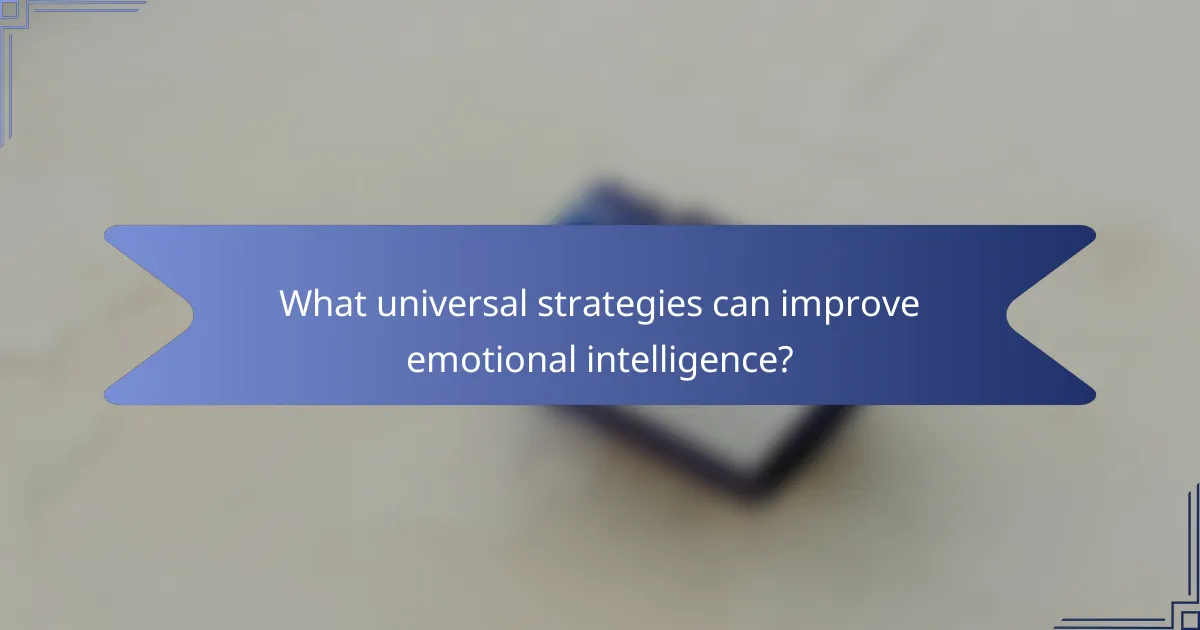
What universal strategies can improve emotional intelligence?
To improve emotional intelligence, focus on self-awareness, resilience, and interpersonal skills. Key strategies include practicing mindfulness, seeking feedback, and engaging in active listening. Mindfulness enhances self-awareness by encouraging reflection on emotions. Seeking feedback from others fosters resilience through constructive criticism and growth. Active listening builds interpersonal skills by promoting empathy and understanding. These strategies collectively enhance emotional intelligence, leading to better personal and professional relationships.
What practices foster self-awareness in daily life?
Practices that foster self-awareness include mindfulness, reflective journaling, and seeking feedback. Mindfulness enhances present-moment awareness, helping individuals recognize their thoughts and emotions. Reflective journaling allows for deeper introspection, revealing patterns in behavior and feelings. Seeking feedback from others provides external perspectives, which can highlight blind spots in self-perception. Engaging in these practices consistently builds emotional intelligence, resilience, and interpersonal skills.
How can resilience be built over time?
Building resilience takes time and intentional practice. Start by cultivating emotional intelligence through self-reflection and mindfulness. Regularly assess your thoughts and feelings to enhance self-awareness. Engage in positive social interactions, as supportive relationships strengthen resilience. Set achievable goals to foster a sense of accomplishment and adaptability. Finally, embrace challenges as opportunities for growth, reinforcing your ability to bounce back from adversity.
What techniques improve interpersonal communication?
Developing emotional intelligence enhances interpersonal communication through techniques such as active listening, empathy, and self-regulation. Active listening fosters understanding, while empathy builds connections. Self-regulation helps manage emotions during interactions, leading to clearer communication and stronger relationships.
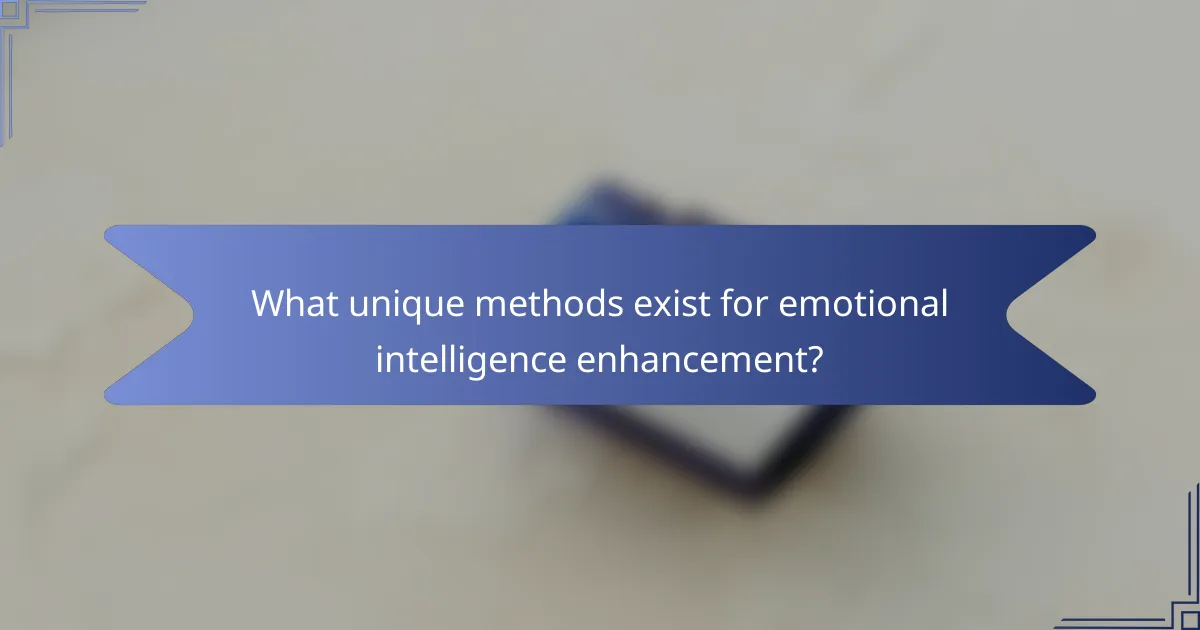
What unique methods exist for emotional intelligence enhancement?
Emotional intelligence can be enhanced through unique methods such as mindfulness practices, active listening exercises, and empathy training. These strategies foster greater self-awareness, resilience, and interpersonal skills.
Mindfulness practices, like meditation, improve emotional regulation and awareness. Active listening exercises enhance communication and understanding in relationships. Empathy training focuses on recognizing and responding to the emotions of others, strengthening social connections.
Incorporating these methods into daily routines can lead to significant improvements in emotional intelligence, ultimately benefiting personal and professional interactions.
How can journaling facilitate emotional understanding?
Journaling enhances emotional understanding by providing a structured way to reflect on feelings and experiences. It allows individuals to articulate emotions, identify patterns, and gain insights into their reactions. This practice fosters emotional intelligence, which is crucial for self-awareness and resilience. Regular journaling can lead to improved interpersonal skills by enhancing empathy and communication. Research indicates that expressive writing can reduce stress and promote emotional clarity, making it a valuable tool for personal growth.
What is the impact of role-playing on emotional skills?
Role-playing significantly enhances emotional skills by fostering empathy, self-awareness, and adaptability. Engaging in role-playing scenarios allows individuals to practice emotional responses in varied contexts, improving their ability to understand and manage emotions. This interactive method promotes resilience by encouraging participants to navigate challenges and develop coping strategies. Furthermore, role-playing enhances interpersonal skills through collaborative interactions, enabling better communication and conflict resolution. Overall, it serves as a valuable strategy for emotional intelligence development, contributing to personal and professional growth.
How can feedback loops strengthen emotional intelligence?
Feedback loops significantly enhance emotional intelligence by promoting self-awareness and resilience. Regular feedback helps individuals identify emotional triggers and patterns, fostering a deeper understanding of their feelings. This process strengthens interpersonal skills as individuals learn to respond constructively to feedback, improving their ability to navigate social interactions. As a result, consistent engagement in feedback loops cultivates a more emotionally intelligent mindset, essential for personal and professional growth.
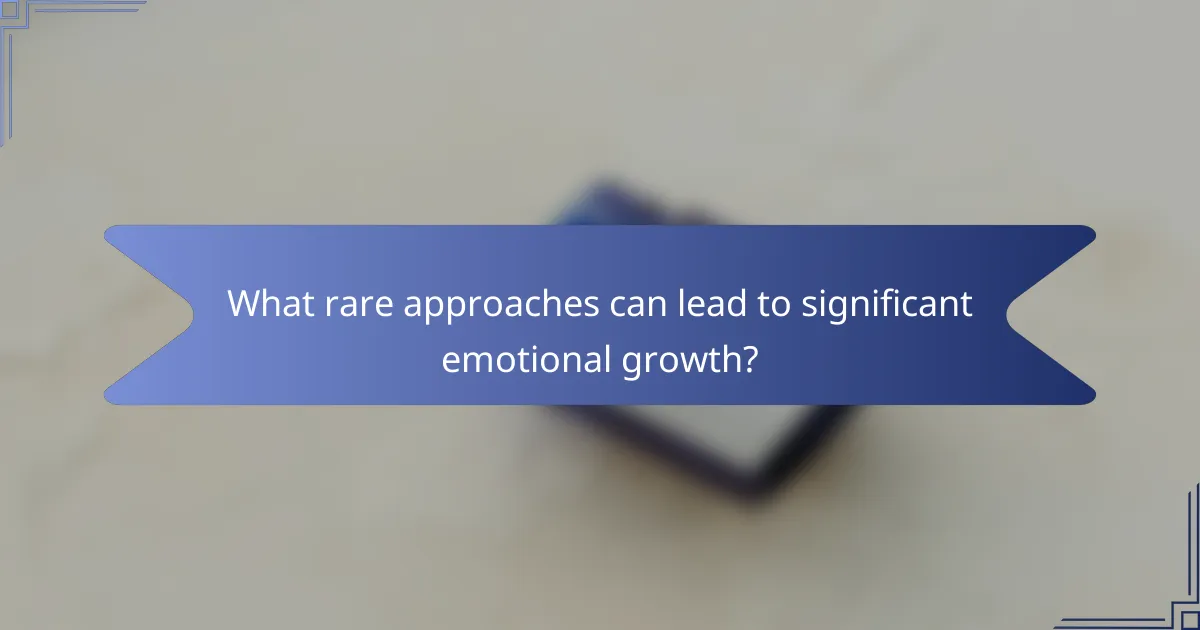
What rare approaches can lead to significant emotional growth?
Engaging in rare approaches can significantly enhance emotional growth. Techniques like mindfulness meditation, which fosters deep self-awareness, and narrative therapy, which reframes personal stories, can lead to transformative insights. Practicing vulnerability in safe environments builds resilience and strengthens interpersonal connections. Exploring art therapy offers unique avenues for emotional expression and processing. Each of these strategies emphasizes self-discovery and emotional regulation, crucial for overall emotional intelligence development.
What are the benefits of immersive experiences in emotional learning?
Immersive experiences significantly enhance emotional learning by fostering deep engagement and empathy. These experiences promote self-awareness, allowing individuals to reflect on their emotions in realistic contexts. They also build resilience by challenging participants to navigate complex emotional scenarios. Furthermore, immersive environments enhance interpersonal skills through interactive role-playing, enabling better understanding of others’ perspectives.
How does art therapy influence emotional intelligence?
Art therapy significantly enhances emotional intelligence by fostering self-awareness, resilience, and interpersonal skills. Engaging in creative processes allows individuals to express emotions non-verbally, facilitating better understanding of their feelings. This practice promotes self-reflection, helping individuals identify emotional triggers and responses. As a result, participants often develop stronger coping mechanisms, leading to increased resilience in challenging situations. Furthermore, art therapy encourages empathy by enabling individuals to connect with the emotions of others, thereby improving interpersonal relationships. Overall, art therapy serves as a powerful tool for enhancing emotional intelligence.
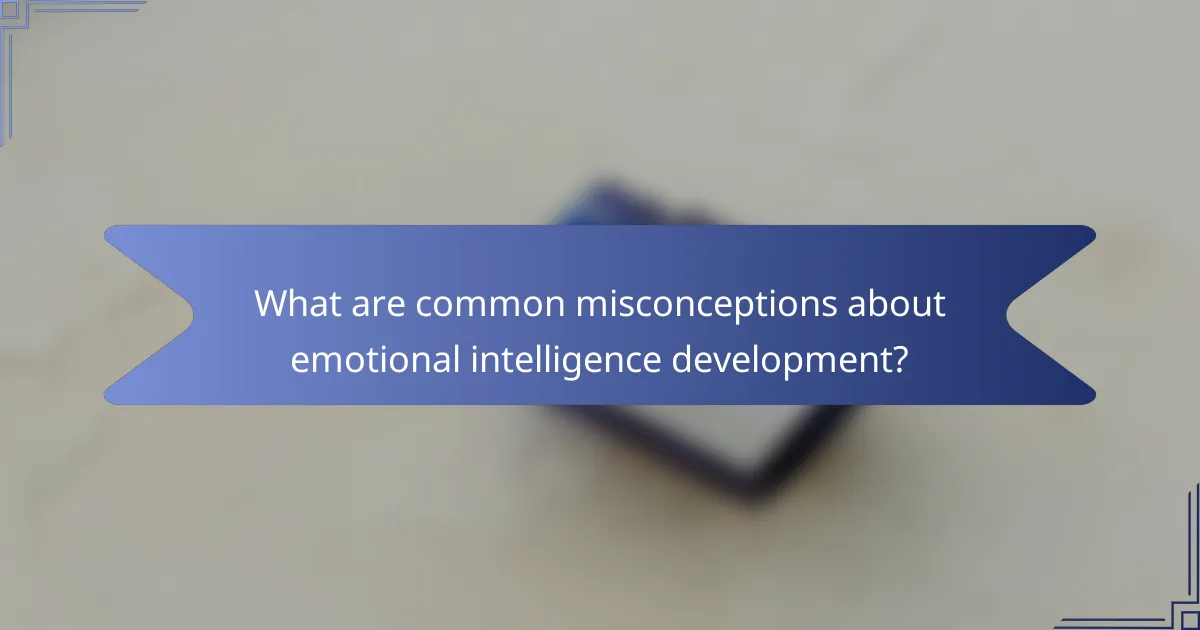
What are common misconceptions about emotional intelligence development?
Common misconceptions about emotional intelligence development include the belief that it is solely innate or fixed. Many think emotional intelligence cannot be improved through practice, which undermines its dynamic nature. Another misconception is that emotional intelligence only involves understanding one’s emotions; it also encompasses managing relationships effectively. Some people assume that emotional intelligence is purely about empathy, overlooking other components like self-regulation and motivation. Lastly, there is a belief that emotional intelligence is irrelevant in professional settings, while studies show it significantly enhances leadership and teamwork.
Why is emotional intelligence not solely innate?
Emotional intelligence is not solely innate because it can be developed through intentional strategies. While some aspects may be influenced by genetics, self-awareness, resilience, and interpersonal skills can be enhanced through practice and learning. Research indicates that training programs focusing on emotional intelligence can lead to significant improvements in these areas. For instance, individuals who engage in mindfulness practices often report higher levels of self-awareness and emotional regulation. Additionally, social interactions and feedback can refine interpersonal skills, demonstrating that emotional intelligence evolves through experience and effort.
What myths exist about resilience and emotional strength?
Many myths about resilience and emotional strength misrepresent their true nature. One common myth is that resilience means being unaffected by stress or adversity, whereas it actually involves acknowledging and managing emotions. Another misconception is that emotional strength equates to always being positive; in reality, it includes experiencing a full range of emotions, including sadness and frustration. Additionally, some believe that resilience is an innate trait, but it can be developed through practice and emotional intelligence strategies. Lastly, the idea that resilient people do not seek help is false; seeking support is a key component of emotional strength.
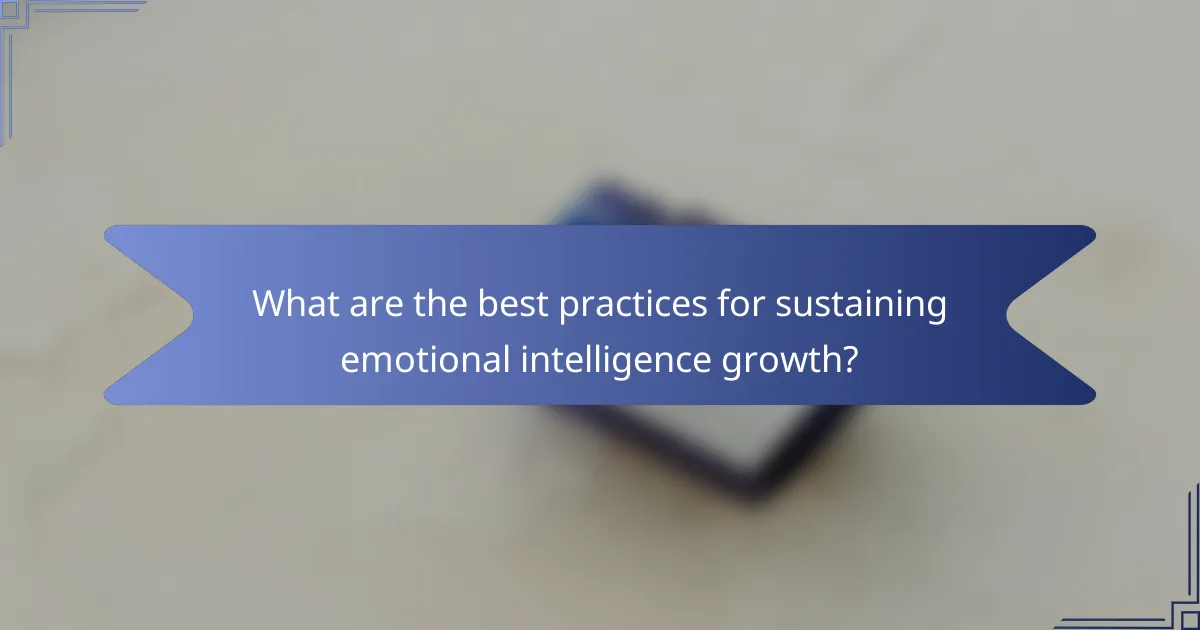
What are the best practices for sustaining emotional intelligence growth?
To sustain emotional intelligence growth, practice self-reflection, seek feedback, and engage in continuous learning. These strategies enhance self-awareness, resilience, and interpersonal skills. Regularly assess emotional responses to various situations to identify areas for improvement. Establishing a routine of mindfulness can also foster emotional regulation, promoting better interactions with others. Engaging in role-playing or empathy exercises can deepen understanding of diverse perspectives, enhancing relational dynamics.
How can regular self-assessment improve emotional awareness?
Regular self-assessment enhances emotional awareness by fostering reflection on thoughts and feelings. This practice promotes deeper understanding of emotional triggers and responses, leading to improved self-regulation. Engaging in regular self-assessment helps identify patterns in behavior, ultimately enhancing interpersonal skills. Research shows that individuals who practice self-reflection regularly report higher emotional intelligence scores, indicating significant benefits for resilience and relationship management.
What strategies ensure continued resilience in challenging situations?
Developing emotional intelligence enhances resilience in challenging situations. Key strategies include practicing self-reflection, fostering empathy, and enhancing communication skills. Self-reflection enables individuals to understand their emotions, while empathy helps in connecting with others. Effective communication facilitates problem-solving and conflict resolution, contributing to overall resilience.
How can one maintain healthy interpersonal relationships through emotional intelligence?
Developing emotional intelligence enhances self-awareness and interpersonal skills, leading to healthier relationships. Key strategies include practicing active listening, recognizing emotions in oneself and others, and responding with empathy. Regular self-reflection promotes understanding of emotional triggers, while setting boundaries fosters respect. Engaging in open communication strengthens connections, allowing for conflict resolution and deeper trust.
What common mistakes should be avoided in emotional intelligence training?
Common mistakes in emotional intelligence training include neglecting individual differences, focusing solely on theory, and lacking practical application. Participants may also overlook the importance of feedback and self-reflection. Additionally, failing to create a safe environment can hinder open communication. Prioritizing these aspects enhances self-awareness, resilience, and interpersonal skills.
What expert insights can guide effective emotional intelligence development?
Developing emotional intelligence requires targeted strategies that enhance self-awareness, resilience, and interpersonal skills. Expert insights emphasize the importance of self-reflection, active listening, and empathy training.
Self-reflection allows individuals to assess their emotional responses and understand their triggers. Regular journaling can facilitate this process. Active listening involves fully concentrating on the speaker, validating their feelings, and responding thoughtfully. This skill fosters stronger relationships and conflict resolution.
Empathy training, often through role-playing exercises, helps individuals recognize and respond to others’ emotions effectively. Engaging in mindfulness practices also enhances emotional regulation, promoting resilience in challenging situations.
Incorporating feedback from peers and mentors can provide valuable perspectives on emotional behaviors, leading to continuous improvement.